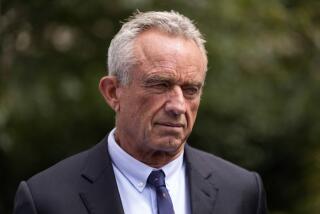Ex-Sen. Abourezk Discloses Secret Trip to Tehran in Late 1979 : Edward Kennedy Efforts to Free Hostages in Iran Told
- Share via
WASHINGTON — In late 1979, in the midst of the Iran hostage crisis and Edward M. Kennedy’s struggle to wrestle away the Democratic presidential nomination from Jimmy Carter, the Massachusetts senator dispatched former Sen. James G. Abourezk on a secret trip to Tehran to gain the release of the 52 Americans held there.
“I risked my life and my career,” Abourezk said Monday as he disclosed the unsuccessful mission made in December, 1979, at a time when Kennedy’s effort to reach the White House was suffering severely because of the hostage crisis. Kennedy confirmed the account through a spokesman.
The episode was revealed for the first time by Abourezk in a letter chiding Joseph Kennedy, the son of the late Robert F. Kennedy, for returning a $100 contribution from Abourezk to the younger Kennedy’s campaign for Congress in Massachusetts.
Controversy Seen
A spokesman for Joseph Kennedy said that the contribution was sent back by an aide who believed that it might be too controversial because Abourezk, who is of Lebanese descent, is chairman of the American-Arab Anti-Discrimination Committee, which takes a sympathetic view of the fiercely anti-Israel Palestine Liberation Organization.
Ironically, it was Abourezk’s Arab background and ties to the Muslim community that led to his being asked to undertake the 1979 trip to Tehran by three associates of Edward Kennedy: then-Sen. John C. Culver (D-Iowa); Theodore C. Sorensen, former aide to President John F. Kennedy; and Jan Kalicki, a foreign policy aide to Sen. Kennedy.
At the time, Abourezk recalled in a phone interview, Kennedy’s attempt to unseat President Carter was in deep trouble, in part because the nation had rallied around Carter in the early weeks of the hostage crisis. To make matters worse for Kennedy, he had been accused by Carter Administration officials of endangering the lives of the hostages by denouncing Shah Mohammed Reza Pahlavi of Iran.
“He had just finished making a statement about the shah being a jerk,” the former South Dakota Democratic senator said. “Carter and his minions came down on him.”
Direct Contact Avoided
Abourezk, who had come to know Kennedy well through their work on the Senate Judiciary Committee, said he did not ask to speak directly to Kennedy. “It was better to give him an element of deniability,” he said.
Accepting only his air fare as compensation, Abourezk said he spent “a few days” in Tehran where he met with then-Foreign Minister Sadegh Ghotbzadeh, who said: “We’re going to have to try (to release the prisoners). Kennedy is a good man.”
But the trip failed because, Abourezk said, the Ayatollah Ruhollah Khomeini was not ready to release the prisoners seized at the U.S. Embassy. The hostages were not freed until President Reagan was inaugurated for his first term on Jan. 20, 1981.
Kennedy said he did not inform the White House of Abourezk’s trip, said James Wieghart, an aide to the senator. In verifying Abourezk’s story, Kennedy added that he “had talked to a number of people and made a number of efforts” to gain the hostages’ freedom, Wieghart said.
Family Support Cited
In a letter to Joseph Kennedy, which he released in Washington Monday, Abourezk wrote: “I think you know that I ran, and won as a delegate for your father in 1968. I have supported your uncles each time they have sought national office primarily because of their courage--and that of your father’s--in facing tough and controversial issues.”
In a statement issued in Boston, Kennedy apologized for the return of Abourezk’s $100 check and added: “In this instance I see a clear difference between Sen. Abourezk’s personal contribution and some of his political beliefs.”
He added that if Abourezk were willing to resubmit his contribution: “I’d be quite honored to accept.”
More to Read
Sign up for Essential California
The most important California stories and recommendations in your inbox every morning.
You may occasionally receive promotional content from the Los Angeles Times.










